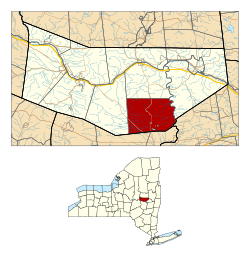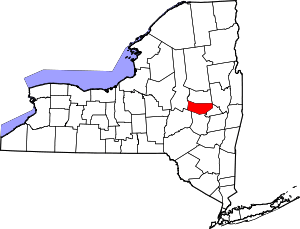Charleston, New York
| Charleston, New York | |
|---|---|
| Town | |
 Location in Montgomery County and the state of New York. | |
| Coordinates: 42°48′53″N 74°20′38″W / 42.81472°N 74.34389°WCoordinates: 42°48′53″N 74°20′38″W / 42.81472°N 74.34389°W | |
| Country | United States |
| State | New York |
| County | Montgomery |
| Government | |
| • Type | Town Council |
| • Town Supervisor | Shayne T. Walters (R) |
| • Town Council |
Members' List
|
| Area | |
| • Total | 42.8 sq mi (110.9 km2) |
| • Land | 42.6 sq mi (110.4 km2) |
| • Water | 0.2 sq mi (0.6 km2) |
| Elevation | 1,250 ft (381 m) |
| Population (2010) | |
| • Total | 1,373 |
| • Density | 32.8/sq mi (12.7/km2) |
| Time zone | Eastern (EST) (UTC-5) |
| • Summer (DST) | EDT (UTC-4) |
| FIPS code | 36-13816 |
| GNIS feature ID | 0978810 |
Charleston is a town in Montgomery County, New York, United States. The population was 1,373 at the 2010 census. The town was named for Charles Van Epps, an early settler.[1]
The Town of Charleston is on the south border of the county and is southwest of the City of Amsterdam.
Charleston is the only town in the county not bordering the Mohawk River.
History
Parts of Charleston were in Corry's Patent (1637), Stone Heap Patent (1770), and Thomas Machin's Patent (1787). Settlers began arriving before the American Revolution.
The Town of Charleston was formed by a division of the original "Town of Mohawk" in 1793. This division, which also created the Town of Florida, terminated Mohawk as a town until another town with that name (Mohawk) was created in 1837. Charleston was reduced in size in 1823, when the Towns of Glen and Root (in part) were established.
The First Baptist Church was listed on the National Register of Historic Places in 1994.[2]
Geography
According to the United States Census Bureau, the town has a total area of 42.8 square miles (111 km2), of which, 42.6 square miles (110 km2) of it is land and 0.2 square miles (0.52 km2) of it (0.54%) is water.
The south town line is the border of Schoharie County, and the east town line is defined by the Schoharie Creek.
New York State Route 30A is a north-south highway. New York State Route 162 cuts across the southwest corner of the town.
Demographics
| Historical population | |||
|---|---|---|---|
| Census | Pop. | %± | |
| 1820 | 5,365 | — | |
| 1830 | 2,148 | −60.0% | |
| 1840 | 2,103 | −2.1% | |
| 1850 | 2,216 | 5.4% | |
| 1860 | 1,837 | −17.1% | |
| 1870 | 1,601 | −12.8% | |
| 1880 | 1,334 | −16.7% | |
| 1890 | 1,174 | −12.0% | |
| 1900 | 1,052 | −10.4% | |
| 1910 | 900 | −14.4% | |
| 1920 | 785 | −12.8% | |
| 1930 | 594 | −24.3% | |
| 1940 | 609 | 2.5% | |
| 1950 | 575 | −5.6% | |
| 1960 | 546 | −5.0% | |
| 1970 | 658 | 20.5% | |
| 1980 | 1,013 | 54.0% | |
| 1990 | 1,107 | 9.3% | |
| 2000 | 1,292 | 16.7% | |
| 2010 | 1,373 | 6.3% | |
| Est. 2014 | 1,349 | [3] | −1.7% |
As of the census[5] of 2000, there were 1,292 people, 472 households, and 343 families residing in the town. The population density was 30.3 people per square mile (11.7/km²). There were 564 housing units at an average density of 13.2 per square mile (5.1/km²). The racial makeup of the town was 97.68% White, 0.85% African American, 0.08% Native American, 0.23% Asian, 0.08% from other races, and 1.08% from two or more races. Hispanic or Latino of any race were 1.16% of the population.
There were 472 households out of which 34.7% had children under the age of 18 living with them, 60.8% were married couples living together, 6.8% had a female householder with no husband present, and 27.3% were non-families. 18.6% of all households were made up of individuals and 7.0% had someone living alone who was 65 years of age or older. The average household size was 2.74 and the average family size was 3.15.
In the town the population was spread out with 26.2% under the age of 18, 7.6% from 18 to 24, 31.3% from 25 to 44, 24.3% from 45 to 64, and 10.6% who were 65 years of age or older. The median age was 37 years. For every 100 females there were 102.2 males. For every 100 females age 18 and over, there were 102.8 males.
The median income for a household in the town was $38,125, and the median income for a family was $45,221. Males had a median income of $35,300 versus $21,184 for females. The per capita income for the town was $16,818. About 6.6% of families and 10.1% of the population were below the poverty line, including 12.6% of those under age 18 and 4.4% of those age 65 or over.
Communities and locations in Charleston
- Burtonville – A hamlet at the east town line by the Schoharie Creek.
- Charleston (also called "Riders Corners") – The hamlet of Charleston is located on NY-30A.
- Charleston Four Corners – A hamlet southwest of Charleston village, located on NY-162.
- Davis Corners – A location southwest of Charleston village on NY-30A.
- Fox Corners – A location southwest of Charleston village.
- Lib Corners – A location northeast of Oak Ridge.
- Lost Valley – A location at the east town line and Schoharie River, north of Burtonville.
- Market Corners – A location between Charleston village and Oak Ridge on NY-30A.
- Oak Ridge – A hamlet south of Charleston village on NY-30A and near the south town line.
- Rockwell Corners – A location by the south town line.
References
- ↑ Zurlo, Sam (15 April 1996). "Area place names reflect local history and personalities". The Daily Gazette. pp. B5. Retrieved 23 April 2015.
- ↑ National Park Service (2009-03-13). "National Register Information System". National Register of Historic Places. National Park Service.
- ↑ "Annual Estimates of the Resident Population for Incorporated Places: April 1, 2010 to July 1, 2014". Retrieved June 4, 2015.
- ↑ "Census of Population and Housing". Census.gov. Archived from the original on May 11, 2015. Retrieved June 4, 2015.
- ↑ "American FactFinder". United States Census Bureau. Archived from the original on 2013-09-11. Retrieved 2008-01-31.
